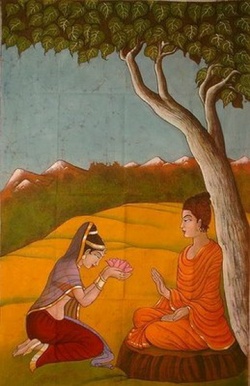Difference between revisions of "Ambapālī"
| Line 1: | Line 1: | ||
[[File:Ambapali.jpg|thumb|250px|]] | [[File:Ambapali.jpg|thumb|250px|]] | ||
| − | ''Ambapālī'' was a wealthy and accomplished courtesan of Vesāli and widely recognized as one of the great beauties of her time. She was described as ‘good to look upon, charming, with a flawless complexion and skilled at singing, | + | ''Ambapālī'' was a wealthy and accomplished courtesan of [[Vesāli]] and widely recognized as one of the great beauties of her time. She was described as ‘good to look upon, charming, with a flawless complexion and skilled at singing, [[Dancing]] and lute playing ‘ (Vin.I,268). She also owned a large mango grove on the outskirts of [[Vesāli]] where [[The Buddha]] and some of his [[Monks]] occasionally stayed (A.IV,100; S.V,141; 301). When [[The Buddha]] was in [[Vesāli]] during his last journey, Ambapālī donated this grove to him to be used as a [[Monastery]] (D.II,95-7). Some time after this, probably in her old age, Ambapālī became a nun and, according to tradition, eventually attained [[Enlightenment]]. In the Therīgāthā there is a poem in 19 verses by her in which she poignantly compares her [[Beauty]] as it once was with how she looked in her old age (Thi.252-70). A thousand years after this, when the Chinese pilgrim [[Hsuan Tsang]] was in [[Vesāli]], he noticed that the [[Monastery]] built in Ambapālī’s grove still functioned and that the woman herself was still remembered. See Prostitution. |
{{R}} | {{R}} | ||
[http://www.buddhisma2z.com/content.php?id=13 www.buddhisma2z.com] | [http://www.buddhisma2z.com/content.php?id=13 www.buddhisma2z.com] | ||
Revision as of 16:14, 8 April 2013
Ambapālī was a wealthy and accomplished courtesan of Vesāli and widely recognized as one of the great beauties of her time. She was described as ‘good to look upon, charming, with a flawless complexion and skilled at singing, Dancing and lute playing ‘ (Vin.I,268). She also owned a large mango grove on the outskirts of Vesāli where The Buddha and some of his Monks occasionally stayed (A.IV,100; S.V,141; 301). When The Buddha was in Vesāli during his last journey, Ambapālī donated this grove to him to be used as a Monastery (D.II,95-7). Some time after this, probably in her old age, Ambapālī became a nun and, according to tradition, eventually attained Enlightenment. In the Therīgāthā there is a poem in 19 verses by her in which she poignantly compares her Beauty as it once was with how she looked in her old age (Thi.252-70). A thousand years after this, when the Chinese pilgrim Hsuan Tsang was in Vesāli, he noticed that the Monastery built in Ambapālī’s grove still functioned and that the woman herself was still remembered. See Prostitution.
